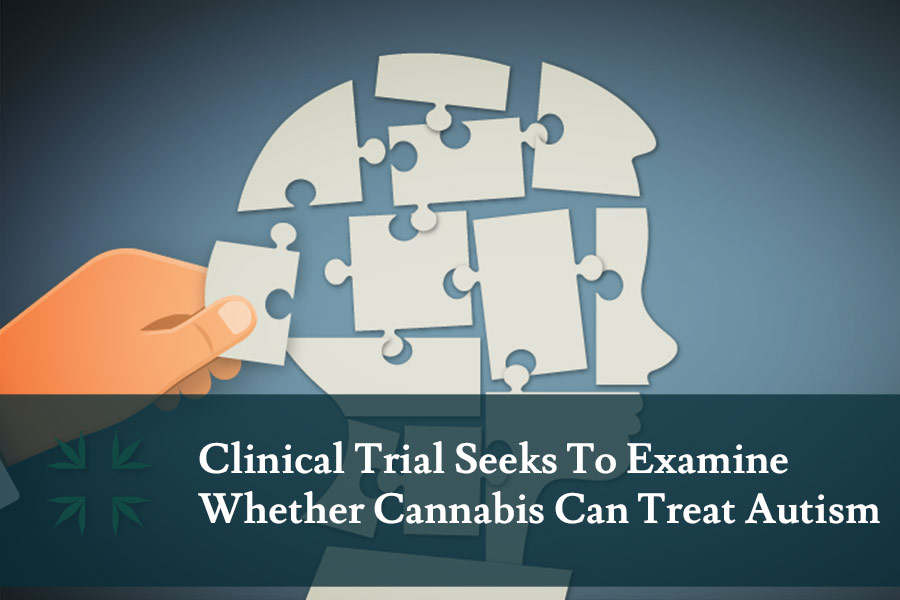A new clinical trial seeks to determine if cannabis could be used to help treat people with autism.
The study is the result of a collaboration between the US Department of Defense and GW Pharmaceuticals and is being carried out at Montefiore Medical Center in New York. The researchers are examining the effect of cannabidivarian (CBDV) on irritability and repetitive behaviors exhibited in children who are on the autism spectrum. CBDV is a non-psychotropic compound found in cannabis which is akin to the more commonly-known CBD, rather than the intoxicating THC also present in the plant.
The research is led by Dr. Eric Hollander, Director of the Autism and Obsessive Compulsive Spectrum Program and Anxiety and Depression Program at Montefiore Hospital. Since there is no known cure for autism, research focus is largely on treating its debilitating symptoms.
Dr. Hollander is hopeful the new study will yield positive results for treating these symptoms with CBDV, given a previous study showing that CBDV reduced seizures in mice and his belief that autism and seizures could share underlying causes. Prior pre-clinical research on CBDV and autism has also been promising.
“And that was one of our thoughts, why this CBDV could be helpful,” Hollander said. “Because if it helps with epilepsy and it helps in terms of decreasing the spike activity, we might also get improvement in some of the aggression, or the self-injury, or the temper tantrums.”
“In some of the animal models that are similar to autism, it was found that CBDV had important effects on social functioning, on decreasing seizures, on increasing cognitive function, and in reducing compulsive or repetitive behavior,” Hollander said. “So for that reason, we wanted to apply that to autism.”
GW Pharmaceuticals founder Dr. Geoffrey Guy also believes autism and epilepsy are closely linked.
“When you look at these – loss of cognitive function, poor socializing skills, poor language skills – what you’re looking at is a phenotype very similar to autism. In my mind, epilepsy and autism-type presentations are on the same continuum,” Dr. Guy said.
The clinical trial involves the observation of 100 participants aged between 5 and 18 years old during 12 weeks of treatment with either CBDV or a placebo, where neither the patient nor the doctor knows who is taking which substance. Dr. Hollander expects the treatment to end in June, 2021, and that the research team will have their final results by the following September.
Some autism researchers welcome the study and other CBD-based studies on autism treatment, but caution that whatever the outcome, the complexity of autism as a condition means larger-scale research will also be necessary.
“CBD may be helpful for only a subset of people and it may benefit different people in different ways. The challenge is to figure out which patients are likely to respond, and which symptoms are most likely to improve,” said Dr. Alexander Kolevzon, clinical director of the Seaver Autism Center at Mount Sinai.
“The field of autism has a long history of enthusiasm for many treatments based on small pilot studies and anecdotal accounts. However, often when these treatments are tested rigorously in larger studies, the benefits are not significantly different than that of placebo,” Kolezon added.
Michael Morrier, Program Director of Child Behavioral Interventions at the Emory Autism Center in Atlanta, echoes Kolezon’s sentiments.
“Anything that’s new that can be something to help a family or an individual to really be a meaningful member of their home, community, school and society is going to be helpful,” Morrier said.
“I would just caution that people don’t just jump on the bandwagon and say, ‘This is a cure all, let’s do it,’ because we really don’t know what are the characteristics it works for, what are the behaviors it works for.”
GW Pharmaceuticals, which is based in the UK and is providing the CBDV compound for the research, at least have good form when it comes to cannabis-based medical research. Their drug, Epidiolex, an oral CBD solution used to manage seizures associated with two rare, severe forms of epilepsy in patients from two years and older, was the first cannabis-based medication to be approved by the US Food and Drug Administration. It is also now approved for use in the UK for certain qualifying conditions.
Clinical trials for Epidiolex showed an average decrease in patient seizures of 45 to 50 percent. Dr. Hollander and the other researchers hope for similar success in treating the debilitating symptoms of autism with another cannabis-based medication.

Leave A Comment